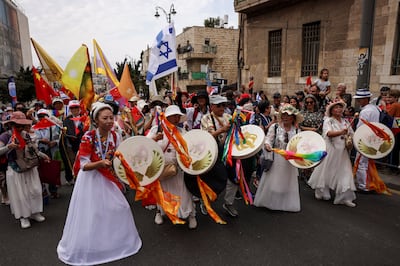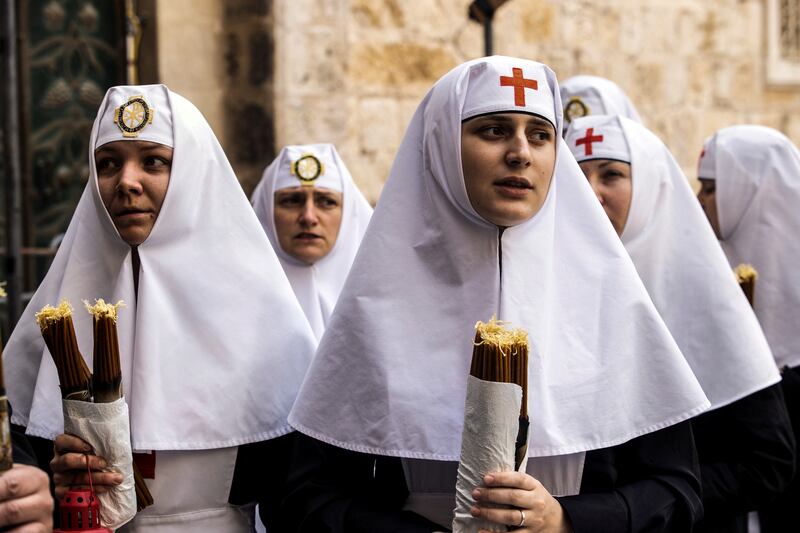The Jewish holiday of Sukkot is coming to an end, marking a turbulent week for Jerusalem’s Christians who have had to endure being spat on, mainly by ultra-Orthodox Jews.
The Christians include Armenians, who have had a presence in the Holy Land for 2,000 years. The National saw two separate incidents at the entrance to the Convent of St James, the spiritual home and residential area for many of the Armenian Quarter’s residents. The incidents happened within 20 minutes of each other.
They also include foreign pilgrims, who provide a significant part of Israel’s tourism revenue. Footage emerged early this week of Jewish adults and children spitting on Christian pilgrims carrying a cross on Via Dolorosa, drawing widespread condemnation from Jews and Christians, Israelis and non-Israelis alike.
There are reports that Pope Francis is furious. The UK’s chief rabbi, Ephraim Mirvis, said on X, formerly known as Twitter: “It is difficult to find the words to adequately condemn such disgraceful behaviour, which is the very antithesis of Torah values.”
Israeli Prime Minister Benjamin Netanyahu said there would be “zero tolerance” for such attacks, despite being in government with ministers who played down the incidents.
Far-right National Security Minister Itamar Ben-Gvir, who is in charge of policing, said spitting was “not a criminal case” and “we need to act on it through instruction and education – not everything justifies an arrest”.
Knesset member Simcha Rothman said the incidents were being “blown out of proportion”.
Nonetheless, Jerusalem police arrested five suspects and called the incidents “disgraceful acts of hatred”, harsh words that Christians in the city have told The National are long overdue at best, empty at worst.
Not all was bad. Just outside the walls of the Old City, pro-Israel Christians from across the world congregated in West Jerusalem on Wednesday for the annual Jerusalem March, part of a series of events organised by the International Christian Embassy of Jerusalem. It was a celebratory event, cheered on by crowds of Israeli Jews.
The contrasting events of the week paint a complex picture of Israel’s interaction with Christianity, particularly during the course of its current government, the most right-wing in the country's history.
Christian Zionists, especially numerous in the evangelical community, have for decades been a pillar of western support for Israel. Israel frequently says it is the only safe place for Christians in the Middle East, a region where religious minorities have been suffering persecution and decline for years.

On the other hand, Palestinian Christians have played a significant role in anti-Israel activism, and even those not involved politics have long complained that life in the Holy Land is becoming intolerable, because of mounting attacks by fundamentalist Jews, illegal settlement activity targeting community buildings and land, and vandalism of church property.
Campaign group Protecting Holy Land Christians says at the current rate of decline, “within a generation there will be no Christian communities left in the Holy Land”. Numbers show the extent of the problem: the group says Christians comprise less than 1 per cent of Jerusalem’s population, down from 11 per cent in the middle of the 20th century.
Sukkot this year drew unprecedented criticism about fringe but mounting fundamentalist Jewish attacks on Christians in the Holy Land. Whether the government and authorities will turn harsh words of condemnation into action depends on which Christian you ask. For those who have lived here the longest, there is resounding pessimism.







